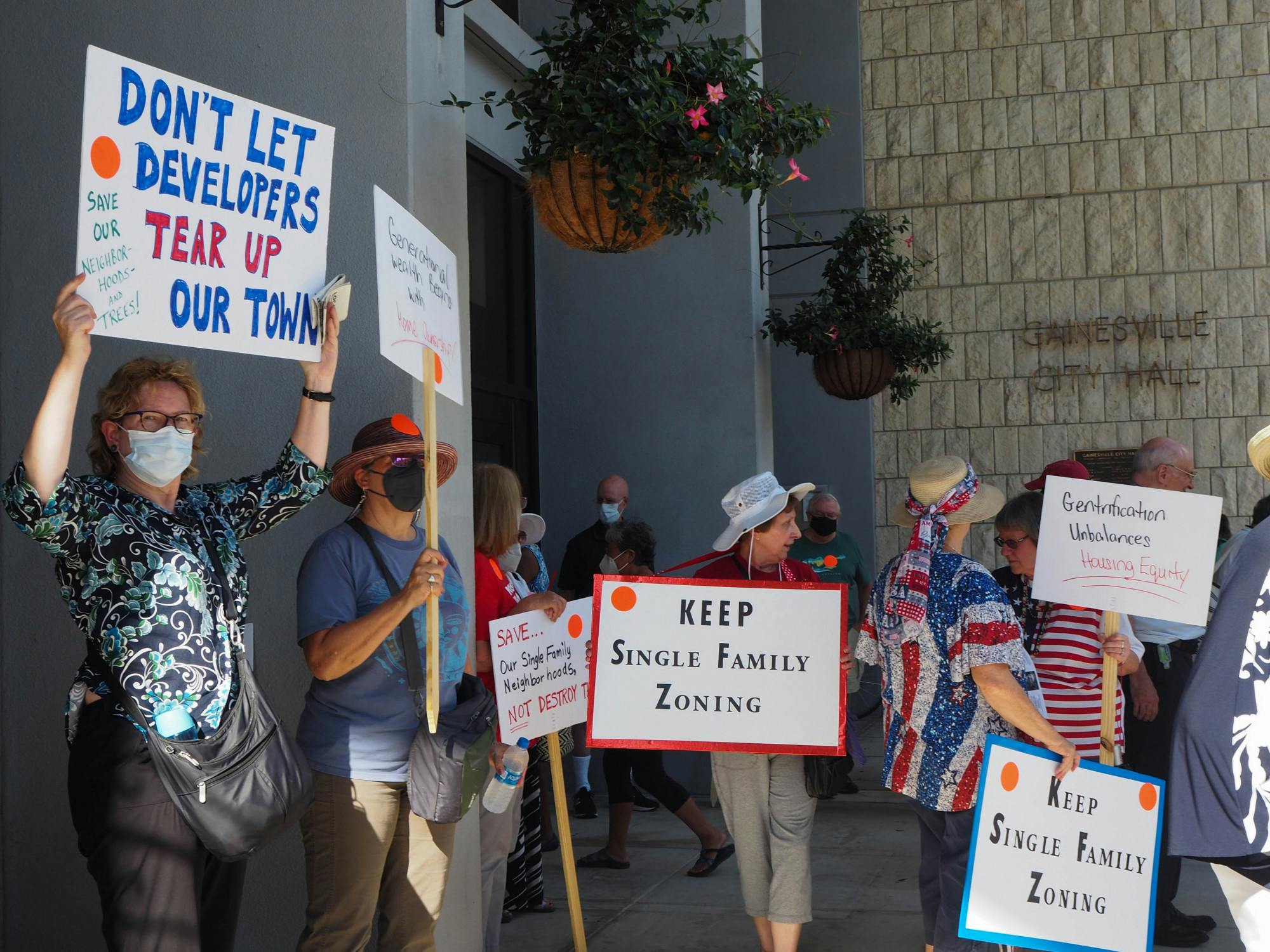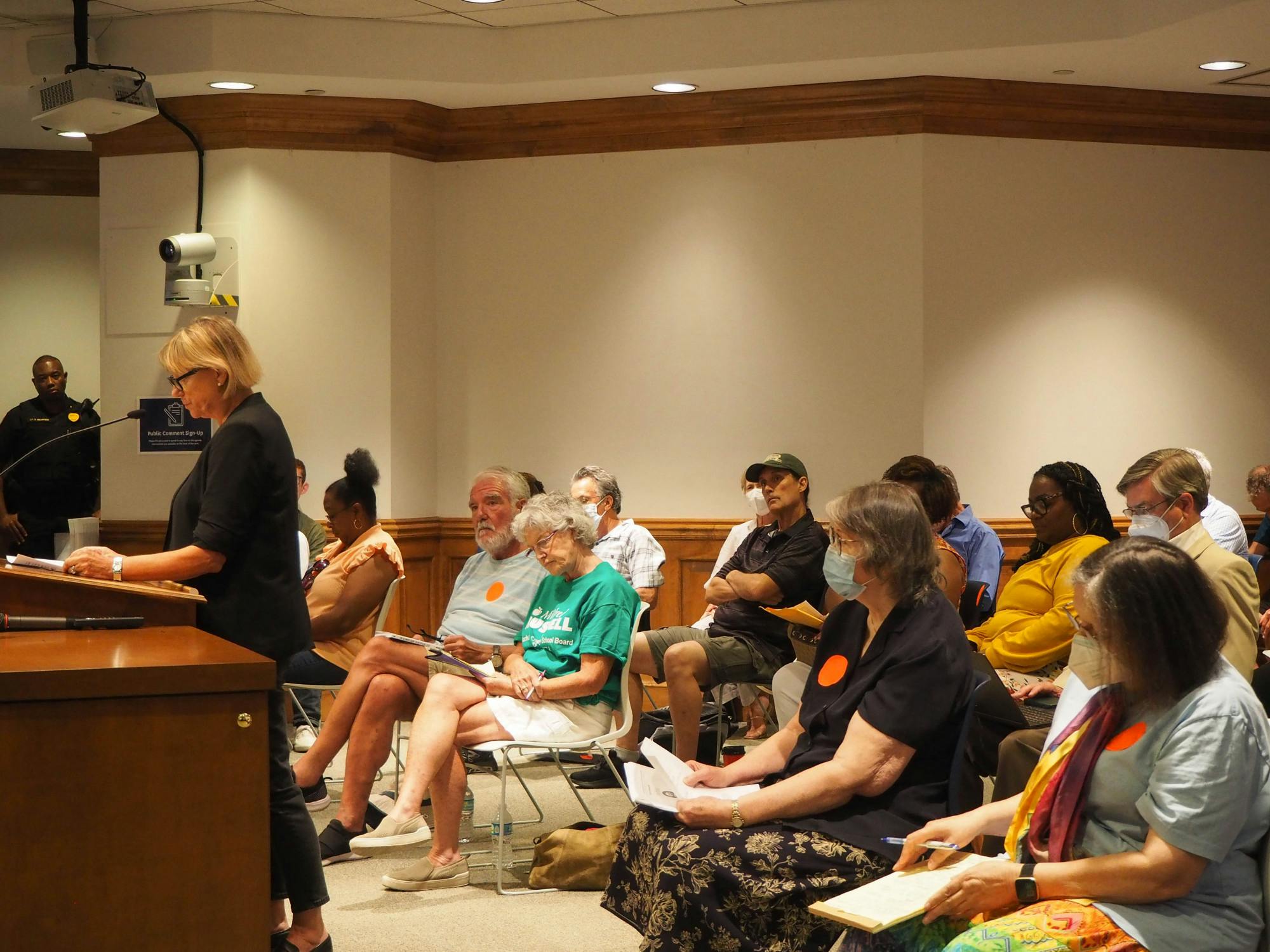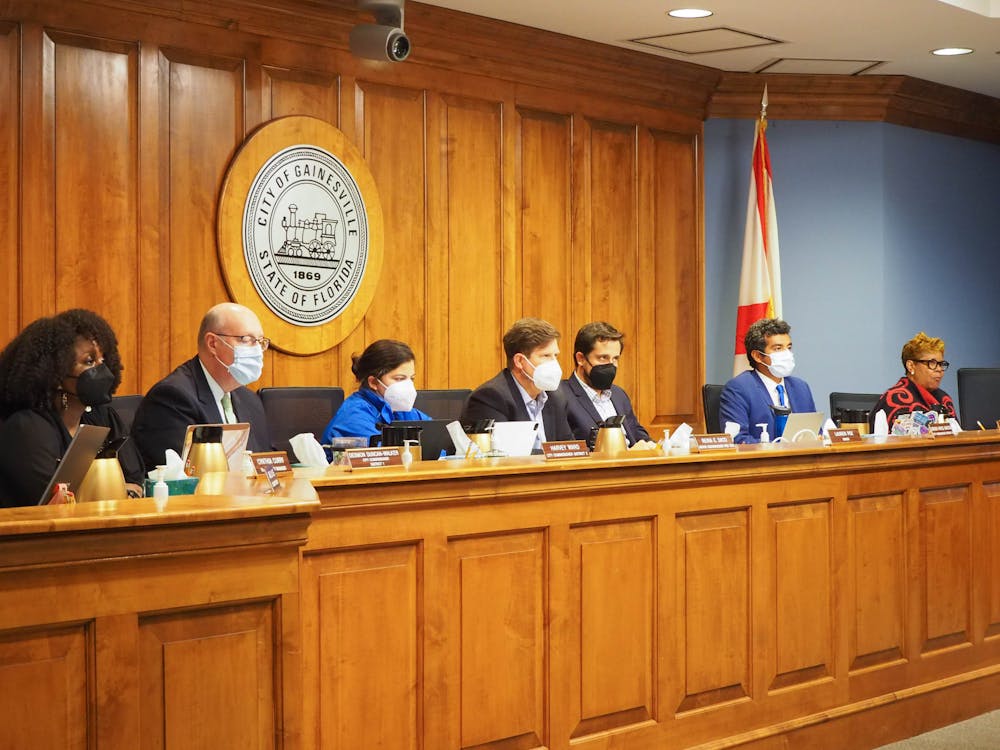Gainesville will be the first Florida city to eliminate exclusionary zoning in a 4-3 city commission vote — a move that didn’t go without intense backlash from community members.
Hundreds of residents crammed into City Hall, for the meeting, which the city scheduled to finish at 10 p.m. Going nearly two hours over the allotted time, the vote finally came shortly before midnight.
Attendees came to express their stance on the city’s plan to eliminate exclusionary zoning and amend occupancy and bedroom limits, which some commissioners say will help solve the city’s affordable housing crisis. The change will allow developers to build two-story multifamily units, like quadruplexes, in residential areas.
After about four hours of more than 80 public comments, Mayor Lauren Poe and Commissioners David Arreola, Adrian Hayes-Santos and Reina Saco voted to approve zoning and occupancy changes. Commissioners Cynthia Chestnut, Desmond Duncan-Walker and Harvey Ward voted against the measures.
“Progress means change, and change always has enemies,” Arreola said.
Other cities in states like Maine and Minnesota have passed similar changes, but many cities remain fearful of taking action due to opposition, Arreola said. He hopes other Florida cities will follow suit after the Gainesville vote.
Supporters of the changes like Arreola believe exclusionary zoning elimination will allow for more housing options in more parts of the city. Opposing voices believe the changes lower property values, lose tree canopies, stress wastewater capacity, harm historic districts, increase gentrification and increase traffic congestion.
Despite being a seasoned local politician, Chestnut said she hasn’t seen anything draw crowds more than this housing issue.
“You have emboldened and organized a Black community like we have never seen before,” she told her colleagues supporting the change.
Outside City Hall, protestors rallied to express their opposition, some donning orange dots on their clothing to represent their cause. Public comments were mostly against the zoning change, with speakers pointing to numerous organizations who were in opposition: unanimous opposition from Alachua County Commission, 1,000 Friends of Florida and three city advisory boards.

Caron Cadle, a 65-year-old Gainesville resident, holds a sign that reads "Don't let developers tear up our town," Thursday, Aug. 4, 2022.
The day before, about 90 residents gathered at Shady Grove Primitive Baptist Church in Porters Quarters to protest against citywide zoning changes.
Addressing public outcry, Arreola said a lot of the petitions had misinformation that caused resident concerns and confusion, as they left out city plans to enforce a two-story limit and limits per units per acre.
He encouraged residents to give zoning changes a chance and pay attention to overall housing issues in the city moving forward.
“The only thing we have to fear is fear itself,” Arreola said, earning laughs from public attendees.
One July petition came from Gainesville resident and landlord Kurt Johnsen, which has garnered around 2,548 signatures, to stop the commission's proposal. There have been more than 4,000 cumulative petition signatures, he said.
“They've chosen to disregard the wishes of their constituents who voted them in,” Johnsen said. “They think they know better and are willing to ignore the will of the voters.”
He said he would support the new commission’s efforts to rescind this decision.
Feeling uneasy about the vote, Commissioner Desmon Duncan-Walker said Gainesville data, an in-depth land-use analysis, an equitable development report and an environmental impact study were necessary for the decision.
“My concern has been that we don’t have data,” she said. “My bigger concern is that it appears we don’t even have the will of the people.”
She motioned to postpone the vote until after Nov. 8, which failed to pass.
Saco recommended the commission pass the ordinances but revert back to current zoning after three or five years to collect data.
But Hayes-Santos said Saco’s recommended period of time is too short to obtain data, as it takes at least two years to grant permits and build.
Commissioners directed city staff to provide an analysis on sunset provisions, which provides an end date to the ordinance, for the commission's consideration when it comes back for second-reading. Hayes-Santos believes this will be done by early September.
Ward, who is also a mayoral candidate, said the city has spent so much time worrying about eliminating the zoning that it has taken away time from finding other housing solutions. He didn’t want to support the changes without considering his constituents.
“There’s been harm to public trust,” he said. “If we don't approach it with the community, it won’t work.”

Kim Tanzer, an architect and former UF professor, speaks to the commission about exclusionary zoning grievances Thursday, Aug. 4, 2022.
Taylor Simmons, an 18-year-old UF political science junior and lifelong Gainesville resident, supports the city’s changes, comparing Gainesville’s housing density to Portland, Maine’s.
“I realized urbanism has less to do with population and more to do with policy,” he said.
The type of affordable housing in Portland is illegal to build in most of Gainesville, he said.
“Exclusionary zoning makes it all but impossible for people of a lower income level to have access to the same schools, jobs and amenities the high-income people have,” Simmons said. “Our people are just as deserving as people from Portland.”
Correction: The city commission did not vote to add sunset provisions. The Alligator previously reported otherwise.
Contact Mickenzie Hannon at mhannon@alligator.org. Follow her on Twitter @MickenzieHannon.

Mickenzie is the local elections reporter and previously covered city and county commission for The Alligator’s Metro Desk. She's a fourth-year journalism major and is specializing in data journalism. When Mickenzie isn’t writing, she enjoys watching horror movies, reading, playing with her pets and attending concerts.






